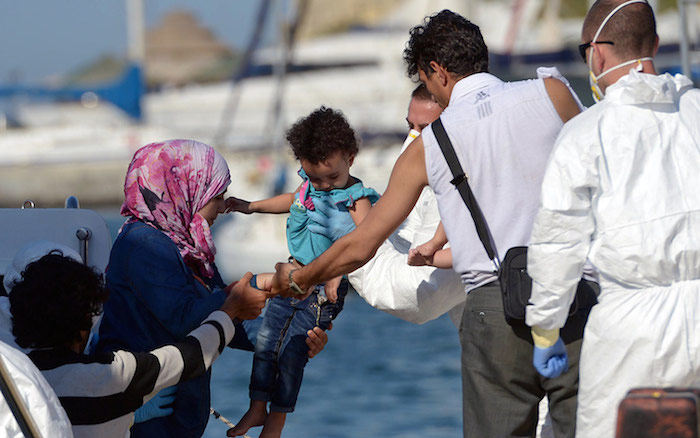Countries around the world are both resisting and struggling to grapple with the influx of desperate people fleeing global crisis.
Thousands of migrants from Africa and the Middle East have been smuggled by human traffickers to Europe or to their death.
Two thousand have died so far this year.
Italy, Greece and Malta have received the most migrants, but the high season for migration begins in June and, sadly, the death toll is certain to rise.
By May 18th, the European Union nations approved a plan for naval operations to go after the human trafficking networks this June and NATO said it stood ready to help with this plan if needed. But this does nothing for the migrants desperate enough to risk their lives in the crossing, fleeing civil wars, persecution, and severe poverty.
Nevertheless, Europe is awaiting a UN resolution to give it the legal right to destroy smuggler boats before they fill with the migrants. Since Libya is one of the main exits, this is where Europe hopes to start.
Consent from Libya is doubtful. Why would Libya okay European navy ships and drones patrolling its coast?
The West’s involvement in that country obviously did not bring about any genuine “Arab Spring”—to say the least!
Even the EU is divided on the issue of mandatory quotas for each member nation for the thousands of refugees already on its shores. Spain, France, Britain, and Hungary refuse to fill a mandatory quota.
Basically the EU’s plan to disrupt human trafficking by destroying boats is a short-term plan that will be costly, dangerous, and difficult to implement.
Compassionate action would be better, but one cannot legislate compassion!
Meanwhile, in the waters of the Bay of Bengal, South China Sea, Andamen Sea, and the Malacca Strait even more perilous sea voyages have been taking place. In these waters more migrants have been stranded, some for over two months, revealing a severe crisis of abuse and poverty in South East Asia.
Thousands of Bangladeshis, and Rohingya Muslims originally from Bangladesh but now fleeing Myanmar have been trapped on boats with little food or clean water, some even having been pushed back into the open seas by the navies of Malaysia and Indonesia.
The apartheid-like conditions in Myanmar have sparked the exodus of the Rohingya, who are fleeing crowded camps with little access to school, health care, or job opportunities. They hope to live free from persecution.
The Bangladeshis joined the exodus fleeing the yearly floods and equally severe poverty of their country, hoping to find work.
Fishermen in Malaysia were the first to help by towing the nearly sinking boats to safety. Ordinary villagers had more compassion than their resisting governments. Sympathetic Malaysians launched donation drives to help feed the migrants while Indonesians brought rice and clothing to the two warehouses where migrants have recently been housed, in spite of officials telling them not to get close.
Finally the PM of Malaysia, Najib Razak, along with the government of Indonesia, offered to provide temporary shelter to these “boat people”—men, women and children. The navy and coast guard of Malaysia have begun conducting search-and-rescue operations with ships and helicopters.
So far about 2000 “boat people” have been rescued. Six thousand migrants, abandoned by smugglers, remain trapped in crowded wooden boats at sea.
But as Southeast Asian governments began to crack down on traffickers under international pressure and media scrutiny, the traffickers have abandoned both the camps on land and the migrants at sea in order to avoid arrest.
In early May Thai police unearthed dozens of bodies from shallow graves on the Thai border. On May 24 and 25 Malaysian authorities discovered a series of graves in at least 28 abandoned camps in Malaysia as well. These vacated camps were used by the human traffickers, who held the desperate people captive in barbwire pens and cages while extorting ransoms from their families.
One wonders if the same will happen to the migrants fleeing the Middle East and Africa, as Europe cracks down on the human traffickers there.
Relephant:
Interdependence & Immigration: Drawing on Buddhist Principles could Save Migrant Lives.
Author: Linda Lewis
Editor: Renée Picard
Image: Google images labelled for reuse











Read 8 comments and reply